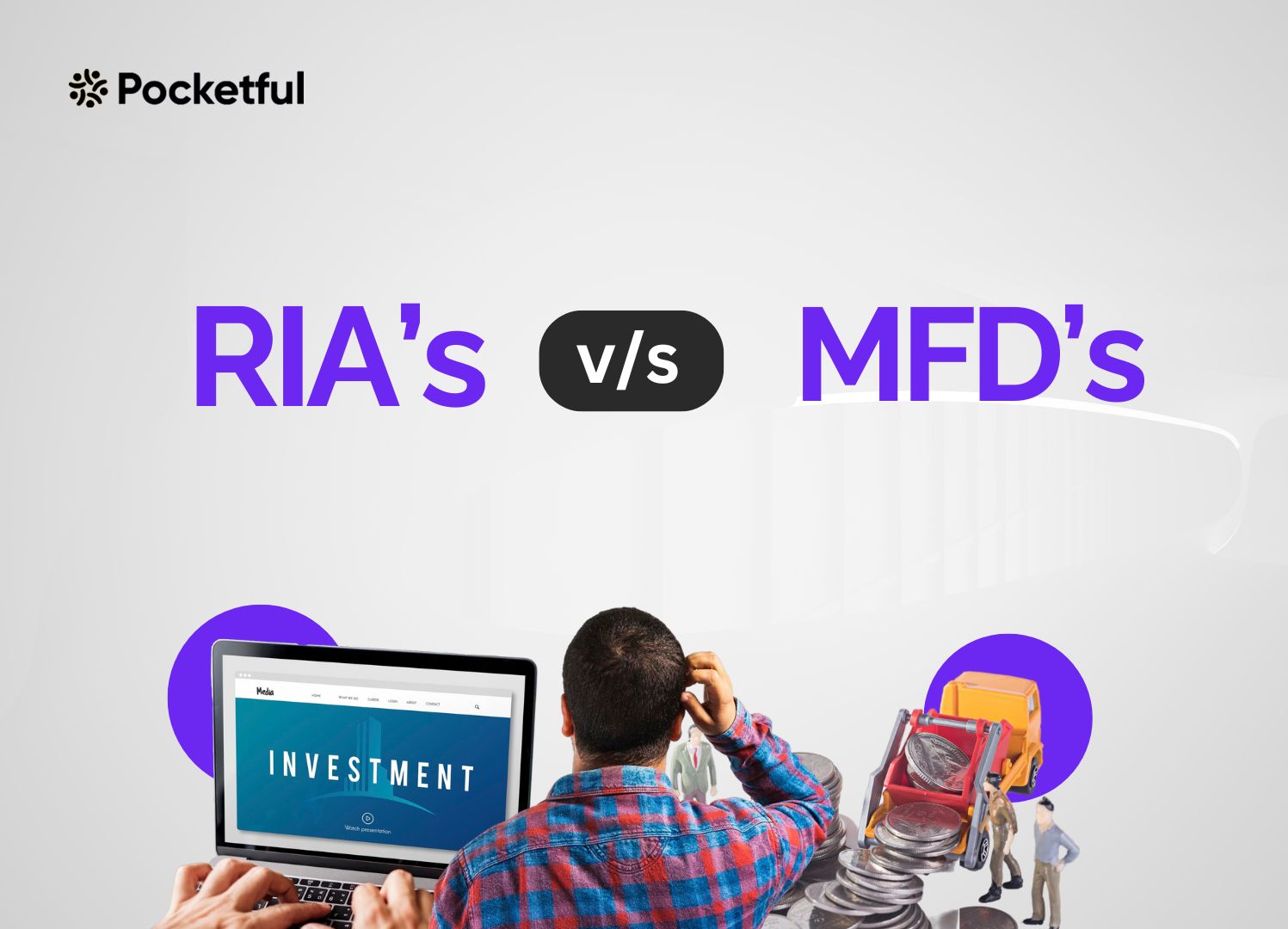| Type | Description | Contributor | Date |
|---|---|---|---|
| Post created | Pocketful Team | May-27-24 | |
| Update Formatting | Nisha | Mar-12-25 |

- Blog
- rias vs mfds
RIAs vs MFDs: Who Is Better?

People have many goals in life, like getting married, having children, buying a dream home, etc. However, nobody knows how to properly plan for such events. This is where investment advisors come in, helping you with thorough financial planning. The problem is, many people confuse SEBI’s Registered Investment Advisors (RIAs) with Mutual Fund Distributors (MFDs).
Keep on reading; all your queries related to this will be cleared.
Mutual Fund Distributors

Mutual fund distributors, or MFDs, are individuals or businesses registered with the Association of Mutual Funds in India (AMFI) who serve as a middleman between asset management firms and investors seeking to purchase mutual funds.
An MFD offers an investment strategy tailored to your risk tolerance and has relationships with several asset management firms. They don’t charge their clients fees; instead, mutual fund firms pay them compensation for introducing investors to their products.
Duties of Mutual Fund Distributors
- Assessment of the risk profile of the client and suggesting the best mutual funds.
- MFD educates the investors about the various mutual fund schemes, their investment objective, and the risk associated with the fund.
- They facilitate the investor’s completion of the necessary formalities to make them eligible for buying and selling mutual funds.
- They also provide all the required support, such as portfolio reviews, market updates, etc.
Eligibility of a Mutual Fund Distributors
- The applicant must be above 18 years.
- To obtain the license from AMFI, the applicant must pass the NISM Series VA Mutual Fund Distributor Exam conducted by the National Institute of Securities Market (NISM).
- The minimum qualification must be class 10th or 12th with three years of diploma.
- Every corporate mutual fund distributor employee must be NISM VA certified.
- After obtaining the license, they are provided an ARN number.
Registered Investment Advisors

Read Also: ITC vs HUL: Comparison of India’s FMCG Giants
According to the Investment Advisor Regulation of 2013, RIAs are financial advisors registered with the Securities Exchange Boards of India (SEBI) as individuals or companies. This registration enables them to provide investment advice to their clients. The only two fee models available to RIAs are fixed fees and asset under management or asset under advisory-based variable costs, as per the most recent change to the RIA Regulation by SEBI in 2020.
Duties of RIAs
- The fiduciary duty of RIA is to act in clients’ best interest, which means they provide advice and recommendations that are solely aimed at benefiting the client without any conflict of interest.
- They also provide a detailed document in which all the details related to fees, services, etc., are mentioned before entering into a contract with the client.
- RIAs provide periodic reports to their client related to their investment performance.
4.The recommendations provided by the RIAs are aligned with the client’s risk profile and financial goals. - RIAs are required to follow all compliance orders issued by the relevant authorities and maintain the required filings.
Eligibility of RIAs
- SEBI mandates few specific educational qualifications to become an RIA, such as a post-graduation degree from a recognized university.
- The applicant must have at least five years of experience in providing financial advisory services.
- The applicants must acquire a necessary certificate recognized by SEBI, named NISM Investment Advisor, for the Level 1 and Level 2 exams or a certified financial planner certificate.
- If you are registering as an individual advisor, you must have a net worth of INR 5 Lakhs; if you are registering as a corporate investment advisor, you must have a minimum net worth of INR 50 lakhs is required.
- After meeting all the eligibility criteria and completing the process, the SEBI issues an RIA number to the applicants, which acts as a unique identification number.
Difference between MFD & RIA
The significant differences between MFD & RIA are defined in the below mentioned table:
| Particulars | MFD | RIA |
|---|---|---|
| Services | Provide facilities to investors relating to execution of mutual funds transactions, following the compliances related to KYC, etc. | RIAs provide advice and guidance on a client’s investment portfolio, tax planning, etc. |
| Tie-up | MFDs collaborate with all the mutual fund companies. | They do not have any particular connection with any mutual fund providers, as they provide only investment advice. |
| Revenue | Their major revenue comes from commissions from the asset management company in which their clients make investment. | They generate their revenue from advisory fees charged to their clients. |
| Regulations | MFDs are regulated by AMFI and SEBI. | RIAs are regulated only by SEBI. |
| Minimum Investment / Fees | MFDs do not set minimum investment criteria; these are set up by the mutual fund schemes in which they want to invest. | RIA may have some minimum fees based on the value of investors’ portfolios. This varies from advisor to advisor. |
Read Also: RBI Action On Kotak Mahindra Bank: Should You Invest?
Conclusion
An MFD is a better alternative if you are starting to invest, have a small portfolio, and want a simple approach to mutual funds. On the other hand, if you have a larger portfolio, several intricate financial goals, and want complete financial planning, you should consider a SEBI Registered Investment Advisor.
In summation, a mutual fund distributor is a better resource for investors seeking advice and direction specific to their mutual fund investments. However, if a person has more complicated financial needs and needs help with estate planning, tax planning, etc., they should consider consulting with a Registered Investment Advisor (RIA).
| S.NO. | Check Out These Interesting Posts You Might Enjoy! |
|---|---|
| 1 | Mahindra & Mahindra vs Tata Motors: Which is Better? |
| 2 | Bank of Baroda vs SBI Bank: Which is Better? |
| 3 | PNB Vs Bank of Baroda: Which is Better? |
| 4 | MRF vs Apollo Tyres: Which is Better? |
| 5 | Bank of Baroda Vs Canara Bank: Which is Better? |
Frequently Asked Questions (FAQs)
Can MFD charge fees from their investors?
MFDs can earn only a commission from AMCs in which their clients invest.
How does RIA make money?
Usually, RIA charges fees based on the percentage of assets or fixed annual fees fromtheir clients for advising them on various financial aspects.
For comprehensive financial planning, whom should I approach?
If you are looking for comprehensive financial planning, you should contact a SEBI Registered Investment Advisor, who is licensed by SEBI to do such work.
What are the minimum fees for taking services from a SEBI RIA?
There is no minimum prescribed limit for taking services from a SEBI RIA as it varies from an investment advisor. However, the SEBI has two types of fees: the first one should not exceed 2.5% of assets under advice or a fee not exceeding INR 1.25 Lakhs per year.
Which certification exam must you pass to become a Mutual Fund Distributor?
NISM conducts an exam called NISM VA (Mutual Fund Distributor), which must be cleared to become an MFD.
Disclaimer
The securities, funds, and strategies discussed in this blog are provided for informational purposes only. They do not represent endorsements or recommendations. Investors should conduct their own research and seek professional advice before making any investment decisions.